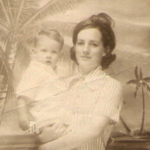I will tell you right up that this is a long post because I feel that it is important.
We are back at it again with another living on less experiment. This time it is a further study on water rationing.
There are people all over the world that have limited resources due to different circumstances. It may be food, water, electricity, gasoline or even soap if your budget is low and you are about to run out of money a week before payday.
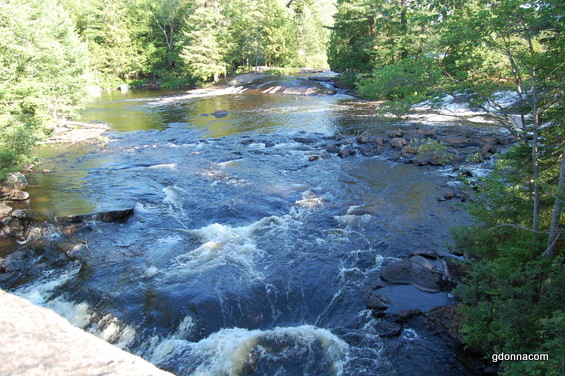
The least we could do is practice how to live with less in case there is an emergency and we should always have stored water for an emergency. It is our responsibility to have emergency supplies for our family. It is also our responsibility to not pollute our natural resources.
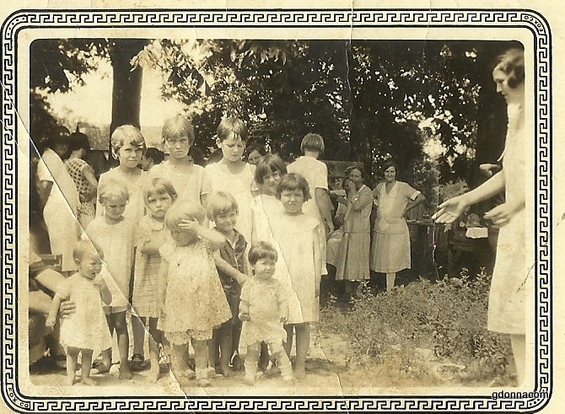
Our ancestors and generations before us lived every day without running water and electricity. They raised families and lived what they considered normal for their time. They hauled their water or pumped it with a hand pump and lever and if we had to do that today we would not waste a drop. In today's world we have become spoiled and complacent with utilities flowing to us and grocery stores catering to most anything we want to purchase.
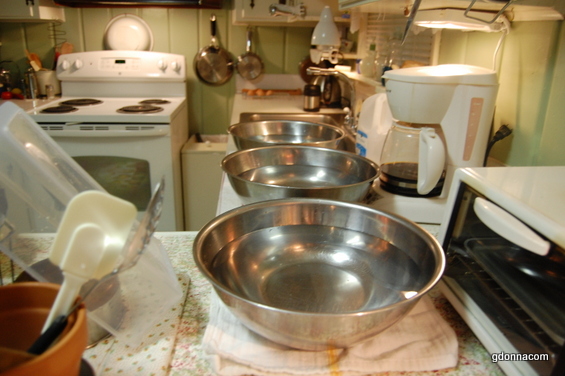
Whatever our reasons for conserving water we must find a way to make it not too difficult or we will probably abandon trying to conserve and go back to our old ways of wasting water.
I have found a way to be more practical about water conservation for our home.
At the time I am writing this article my husband and I are rationing water for one month so we can find out exactly how much water we need to cook, eat, drink, bathe, flush our toilets and wash our clothes should there be a water emergency. When we do these drills or experiments we take it serious and it makes us feel more prepared and so we do not worry so much about this issue AND to settle my mind because I am one of those types that just have to know.
We live in a simple home. We have electricity, water and sewer. We have electric appliances that you would find in a typical home. The difference in our home is we choose what we turn on. When the weather is very hot or cold and we need to run air conditioning or heat for extended periods we may turn off our hot water heater and use kettles to heat our water. We have our hot water heater off now as I am writing this article. If we have company then we most likely turn the water heater back on.
We turn everything off at times to remind ourselves what we would do in an emergency should one arise. We keep a check on our supplies and try to stay as prepared as we can so we can be comfortable during an outage.
In our area water and sewer fees keep increasing. The cost of the water has increased and the fees for the water going out to the sewer are much higher. If we reduce the amount coming in we reduce the charge going out. My husband and I agree that we should not waste any of our natural resources.
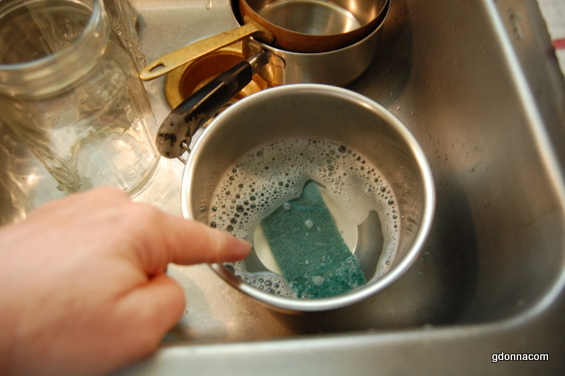
I have found that conserving water while hand washing dishes is quite a science project. I think I now have a better handle on this and it has taken me awhile to figure it out.
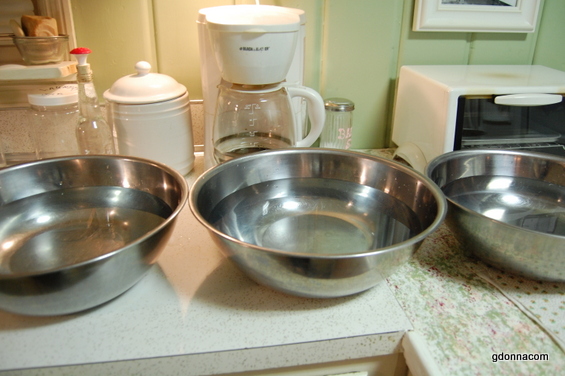
Anything I do in life is trial and error. This is just how I am doing the best I can with conserving water while washing dishes. If I were "rationing" water I would do this different.
These three pans are for rinsing after washing. They contain hot water and the last pan on the right has very hot water.
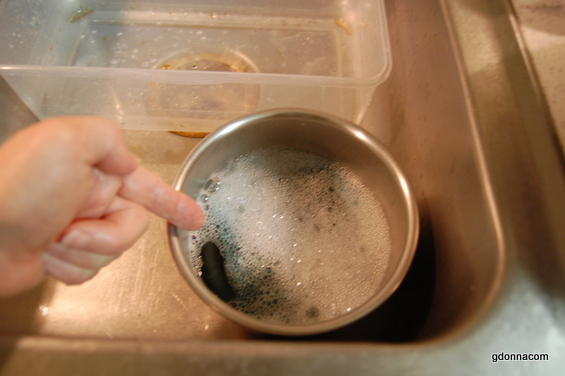
This very small pan in the right sink has a small amount of dish soap and water and a washing pad.
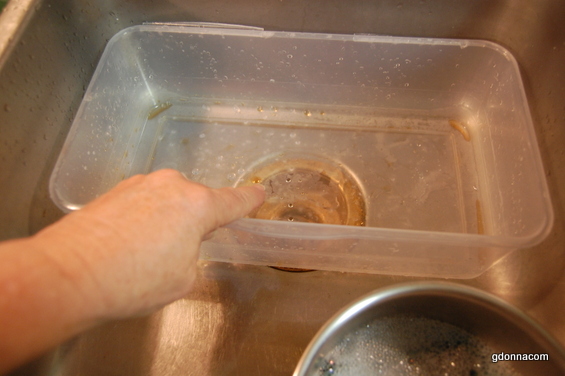
This little plastic pan is for placing items that have been washed after the second wash and waiting to be rinsed.
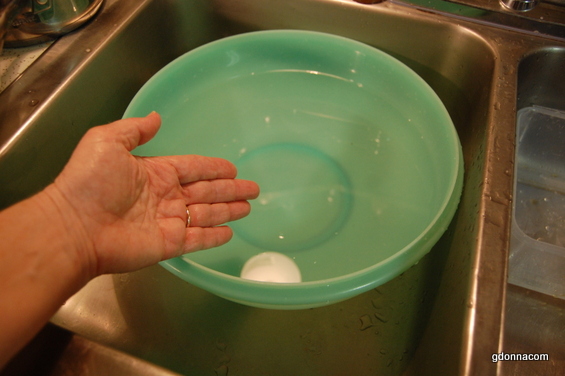
This pan is in the left side of the sink and has hot water and is the first rinse/wash. All containers have "one gallon" of water. One in each one, total 4 gallons. Two gallons will be reused. If I have a lot of dishes and very dirty I put soap in this bowl.
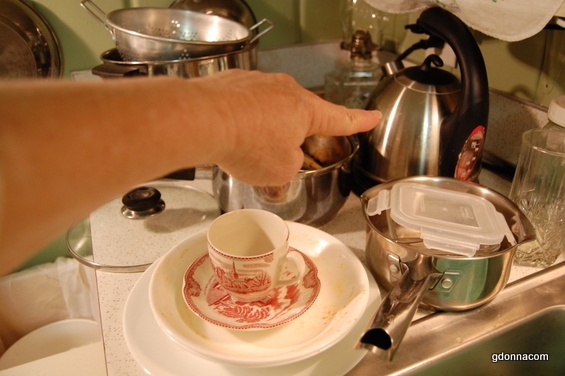
I keep a kettle that holds 2 quarts of water and it boils water and I use it for the last rinse and clean up.
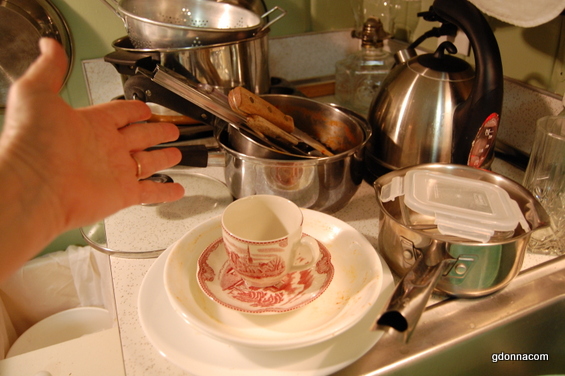
Now we just need dirty dishes...... and I have plenty. I will use a total of 4 gallons and re-use 2 out of those 4 gallons so actually only 2 Gallons will go down the drain.
Here we go......
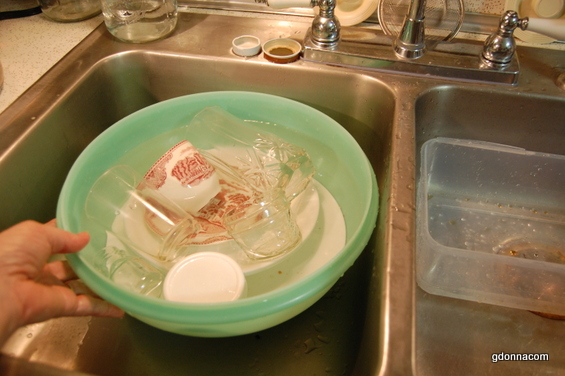
Put the dirty dishes in the first rinse/wash. I would like to mention it is best to scrape all the dishes before washing. Using a rubber spatula helps to clean them out before washing.
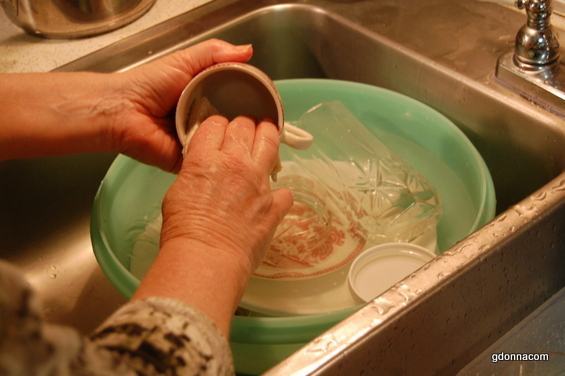
First wash....
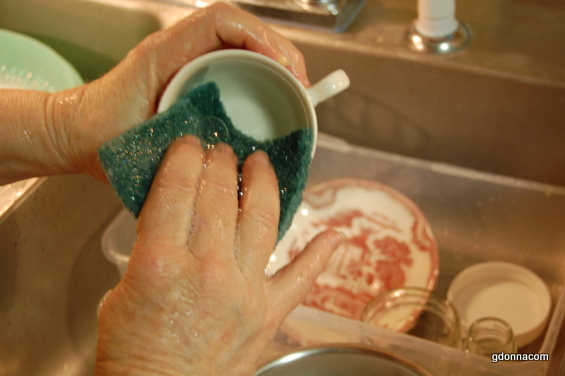
Second wash on the other side with the soap from the small metal bowl.
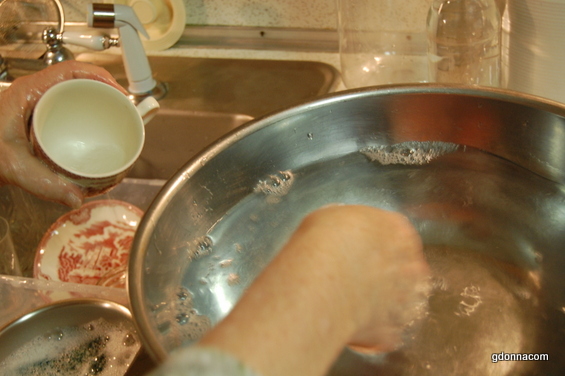
Splash a small amount of water out of the first metal bowl over the soapy cup before putting in the bowl to remove some of the soap.
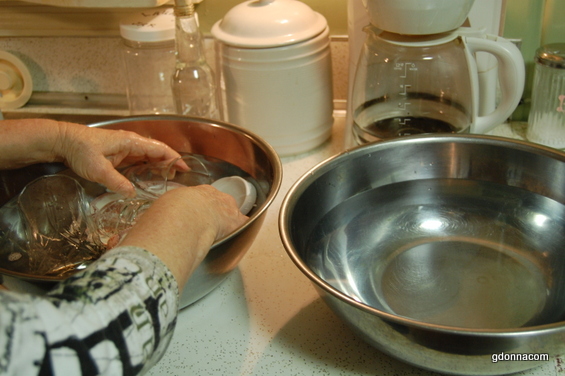
Rinse a few in the first....
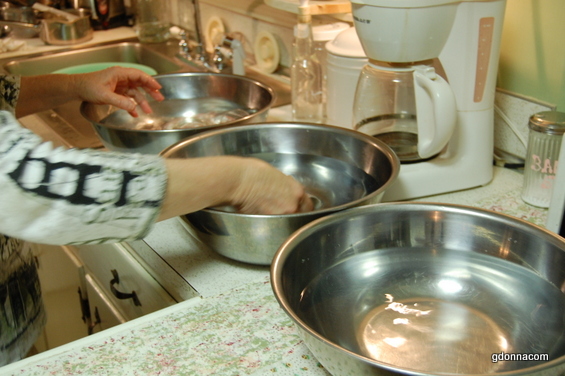
Move along.... into the second..
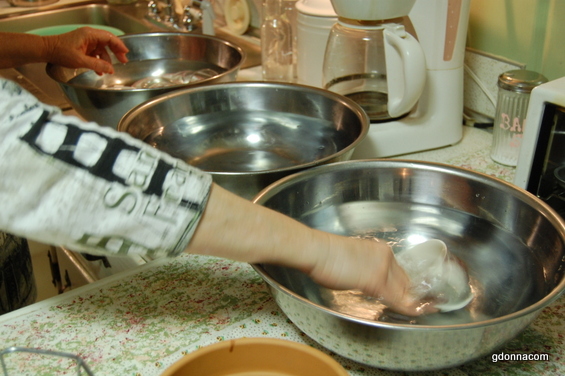
Into the last very hot water....
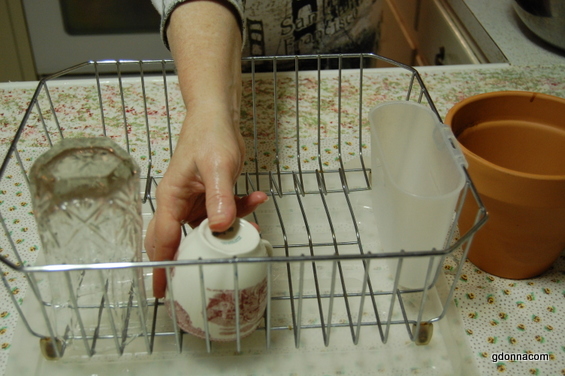
Place in the dish drainer....
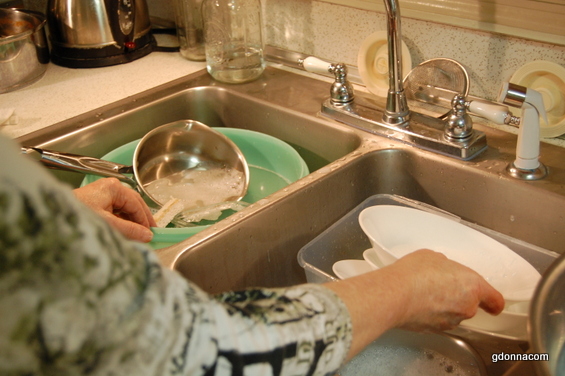
Keep washing this way, first rinse, wash, three rinses.......
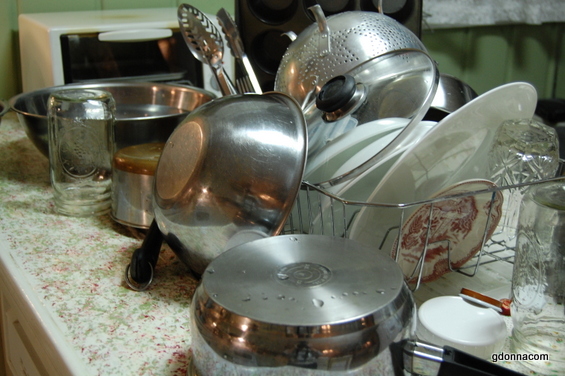
Here we have pots, pans, glasses and dishes..... now what to do with the water...
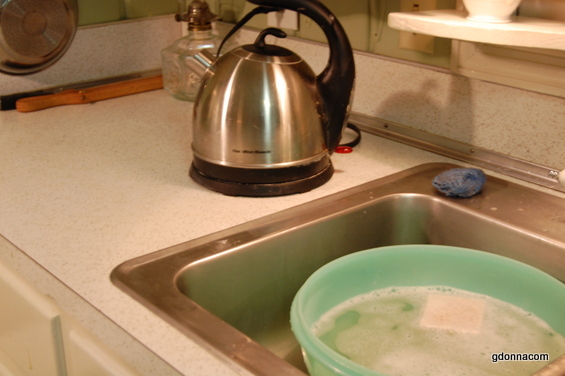
There is still some very hot water left in the kettle...
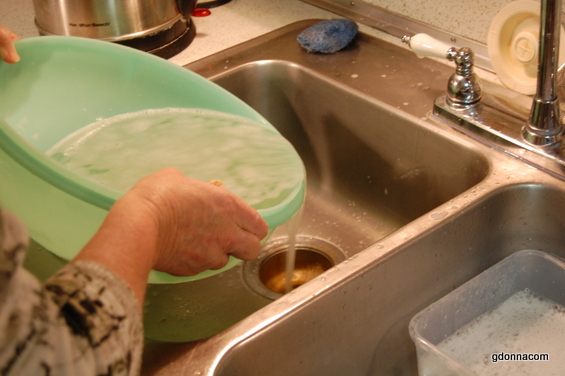
Pour the first rinse water (one gallon) down the drain. This water is the most dirty water of all the pans.....
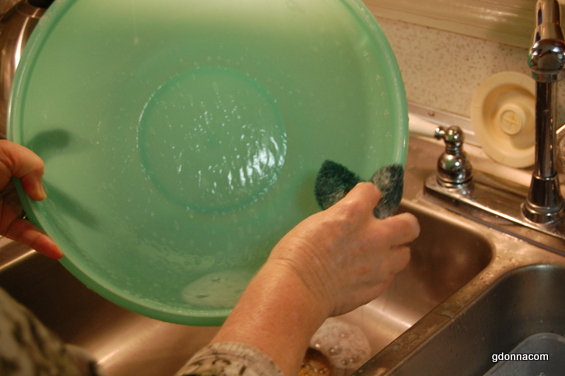
Wash this pan with remaining soap in right side of sink....
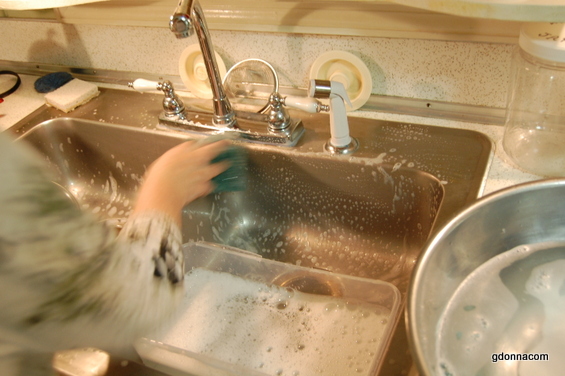
Wash the both sides of the sink with remaining soap.... Still only one gallon down the drain....
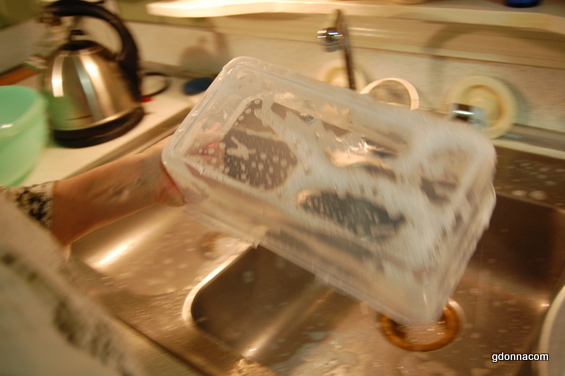
Now use the water that was caught in this pan while tossing water by hand over the dishes.... Use this water to flush down the greasy water from the green pan....
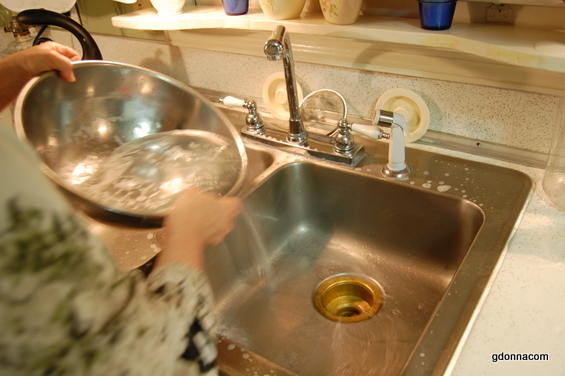
Now the first right hand side clear rinse water washes all the soap from cleaning the sink... This is the second gallon of water. Some of this water was displaced when tossing a bit of water out over the soapy dishes.....
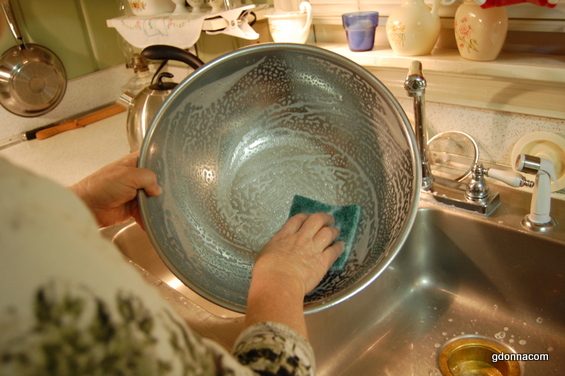
Wash this first rinse pan with remaining soap... Rinse with a bit of the second rinse pan....
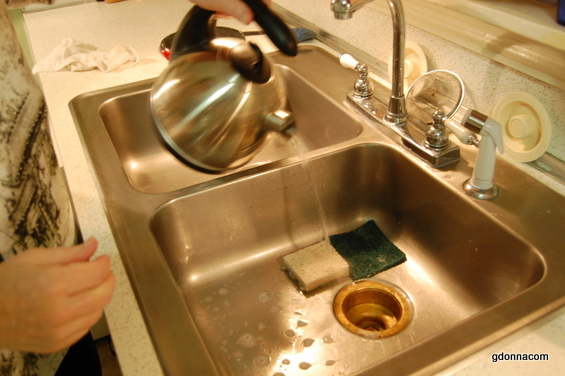
Use remaining hot water to pour over the sponges and sink....
You ask? What about the 2 quarts in this kettle? The last bowl that was used for the last rinse was not a full gallon so some of the hot water from the kettle was added to that pan to make that very hot water. This is still a total of 4 gallons used for all this washing and still two of the gallons will be reused.
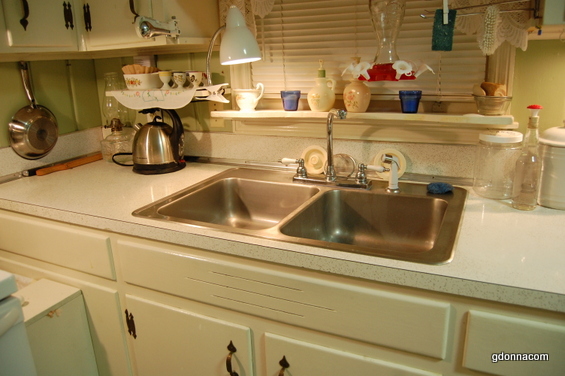
The dishes are done and now we reserve the last two gallons of water...
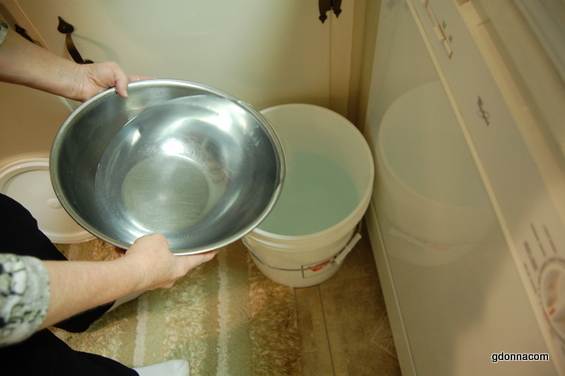
Both pans of water are poured into a bucket because it is basically fairly clean water. This water is used for many things such as watering plants, flushing toilets or even the last rinse water can be used for the first rinse of the next load of dishes if you are going to cook another meal soon.
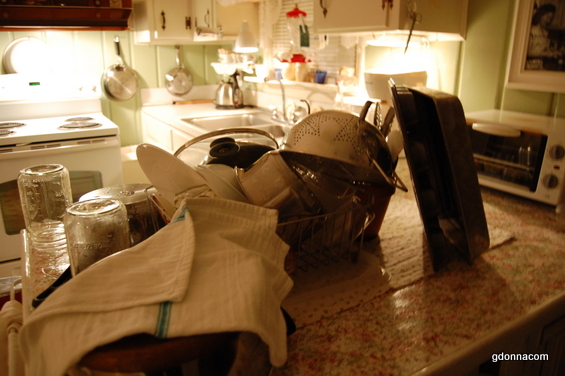
The dishes are either aired dried or dried with a clean dish towel.
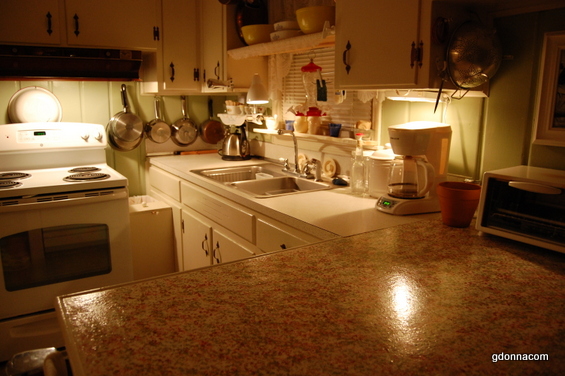
I prefer to go to bed with a clean kitchen, it does not happen every night but I prefer to do it this way. I know this was a long post but I felt it was important....
I hope this helps, Grandma Donna
